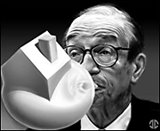
There's an excellent
article in
The Economist; I highly recommend reading it. There is so much quotable material that if I did so, this post would be too large; I'll just quote some of the more poignant remarks.
On Mr Greenspan's watch, America has also experienced the biggest stockmarket and housing bubbles in history. Presiding over one bubble could be seen as bad luck; presiding over two smacks of carelessness.
The Greenspan era will not end on January 31st. Instead, his legacy will linger in the shape of the biggest economic imbalances in American history: a negative household saving rate and a record current-account deficit (see chart 1). Until these imbalances unwind—a process that could prove painful—it is too soon to applaud Mr Greenspan's record.
The Economist's long-running quarrel with Mr Greenspan is that he chose not to restrain the stockmarket bubble in the late 1990s or to curb today's housing bubble. He has declared himself vindicated in not pricking the equity bubble with higher interest rates, but instead to let it burst and then cut rates sharply to “mop up” the damage.
Asset-price inflation can be as harmful as conventional inflation. A sudden collapse in share or house prices can trigger a deep downturn.
From a risk-management perspective, the case for acting against the housing bubble is even greater than for the stockmarket bubble. A housing bubble has bigger wealth effects on consumer spending, so a collapse in house prices would cause more economic harm than one in share prices. Such a bubble is more likely to create financial instability because people borrow more to buy homes. And raising interest rates is a more powerful tool against rising house prices than share prices.
In December Mr Greenspan was made a Freeman of the City of London. One of the traditional perks of this honour is that he can be drunk and disorderly without fear of arrest. The snag is that his policies have also encouraged drunk and disorderly asset markets and intoxicated consumers. When the party ends, Mr Greenspan will not be there to clean up the mess. But end it surely will.
 There's an excellent article in The Economist; I highly recommend reading it. There is so much quotable material that if I did so, this post would be too large; I'll just quote some of the more poignant remarks.
There's an excellent article in The Economist; I highly recommend reading it. There is so much quotable material that if I did so, this post would be too large; I'll just quote some of the more poignant remarks.
3 comments:
Greenspan's biggest mistake was to drop the federal rate to 1% and for so long. This allowed for lending to get out of control and discouraged savings. During this "stimulus" existing jobs were moved over seas, and the new American jobs were mostly RE related.
They thought they were doing the right thing from generic satistical view points. Too bad it was not as easy as that.
Sometimes I stare up and wonder for chunks at a time what Bernake could and will do. No matter what he does, something is going to fail. Plus he could accomplish the opposite of his intensions according to Economic Rot.
OT request, can you please choose a different template for your blog? Small white type on a black background may be cool for college rock bands, but it EXTREMELY hard to read. Especially when it's italicized.
I had to left click and drag down to read the latest post.
Thanks!
Such a bubble is more likely to create financial instability because people borrow more to buy homes.
This effect is possibly worse than the dot-bomb, because increasing cost-of-living for professionals will affect the viability of all bay area businesses long-term. If workers leave for less financial stress, businesses eventually may follow.
Post a Comment